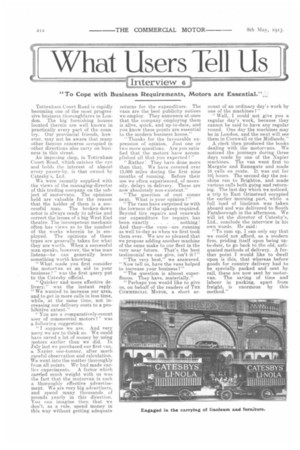at Users Tell Us
Page 20

If you've noticed an error in this article please click here to report it so we can fix it.
Interview 6
" To Cope with Business Requirements, Motors are Essential."Zz
Tottenham Court Road is rapidly becoming one of the most progressive business thoroughfares in London. The big furnishing houses located therein are well known in practically every part of the country. Our provincial friends, however, may not be aware that many other famous concerns occupied in • other directions also carry on business in this street.
An imposing shop, in Tottenham Court Road, which catches the eye and holds the interest of almost every passer-by, is that owned by Catesby's, Ltd.
We were recently supplied with the views of the managing-director of this trading company on the subject of motorvans. The opinions held are valuable for the reason that the holder of them is a successful man. The broken-down actor is always ready to advise and correct the lessee of a big West End theatre. The incompetent mechanic often has views as to the conduct of the works wherein he is employed. The opinions of these types are generally taken for what they are worth. When a successful man speaks, however, the wise man listens—he can generally learn something worth knowing.
" What made you first consider the motorvan as an aid to your business?" was the first query put to the Catesby official.
"Quicker and more effective delivery," was the instant reply. "We wanted to increase our area, and to get in more calls in less time, while, at the same time, not increasing our delivery costs to a prohibitive extent."
"You are a comparatively-recent user of commercial motors? " was a following suggestion. "• suppose we are. And very sorry we are to think so. We could have saved a lot of money by using motors earlier than we did. In July last we purchased our first van, a Napier one-tonner, after much careful observation and calculation. We went into the matter thoroughly from all points. We had made earlier experiments. A factor which carried much weight with us was the fact that the motorvan is such a thoroughly effective advertisement. We are very big advertisers, and spend many thousands of pounds yearly in this direction. You can imagine then that we don't, as a rule, spend money in this way without getting adequate returns for the expenditure. The vans are the best publicity notices we employ. They announce at once that the company employing them is alive, quick, and up-to-date, and you know these points are essential to the modern business house."
" Thanks for the favourable expression of opinion. Just one or two more questions. Are you satisfied that the motors have accomplished all that you expected?"
"Rather ! They have done more than that. We have covered over 13,000 miles during the first nine months of running. Before their use we often experienced, of necessity, delays in delivery. These are now absolutely non-existent."
" The question of cost comes next. What is your opinion ? " "The vans have surprised us with the lowness of the upkeep required. Beyond tire repairs and renewals our expenditure for repairs has been exactly . . nothing ! And they—the vans—are running as well to-day as when we first took them over. We are so pleased that we propose adding another machine of the same make to our fleet in the very near future. That's the best testimonial we can give, isn't it ? "
"The very best," we answered. "Now tell us, have the vans helped to increase your business?" "The question is almost superfluous. They have, materially!'
"Perhaps you would like to give us, on behalf of the readers of THE COMMERCIAL MOTOR, a short ac
count of an ordinary day's work by one of the machines 7 " "Well, I could not give you a regular day's work, because they cannot be said to have any regular round. One day the machines may be in London, and the next will see them in Cornwall or the Midlands."
A clerk then produced the books dealing with the motorvans. We noticed the journeys during three days made by one of the Napier machines. The van went first to Margate and Ramsgate and made 16 calls en route. It was out for IA hours. The second day the machine ran to Brighton, and made various calls both going and returning. The last day which we noticed, a trip to East Grinstead occupied the earlier morning part, while a. full load of linoleum was taken aboard and was delivered to South Farnborough in the afternoon. We will let the director of Catesby's, Ltd., conclude the interview in his own words. He said : "To sum up, I can only say that. we could not afford, as a modern firm, priding itself upon being upto-date, to go back to the old, antiquated methods of delivery. A further point I would like to dwelt upon is this, that whereas before goods for country delivery had to• be specially packed and sent by rail, these are now sent by motorvan. The saving of time and labour in packing, apart from freight, is enormous by this method."


























